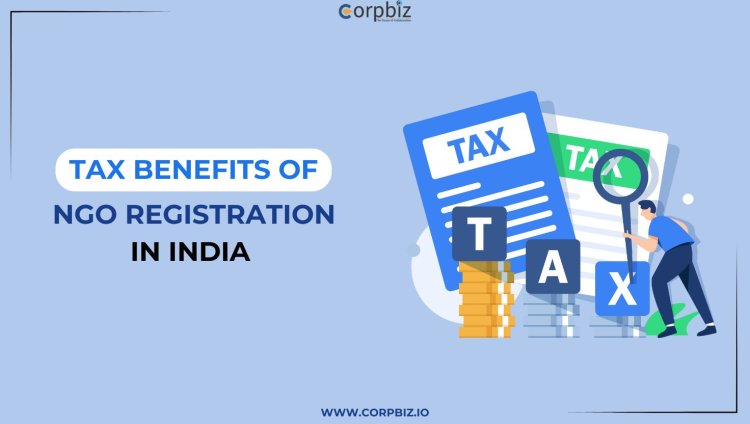Understanding the Tax Benefits of NGO Registration in India
Discover the tax benefits of NGO registration in India, including 12A & 80G exemptions. Learn how to register an NGO, trust, or Section 8 company easily.

Non-Governmental Organizations (NGOs) play a crucial role in social development by addressing various issues such as education, healthcare, and poverty alleviation. Many entrepreneurs and socially-driven startups are now looking at NGO registration to create a positive impact while also enjoying tax benefits.
If you are wondering How to Register an NGO In India and what tax exemptions are available, this guide will help you understand everything in simple terms.
Types of NGO Registration in India
Before we dive into the tax benefits, let’s first understand the different types of NGO Registration in India. There are three common ways to register an NGO:
- Trust Registration – Suitable for charitable and religious activities.
- Society Registration – Best for education, art, and culture organizations.
- Section 8 Company Registration – Ideal for businesses aiming for social welfare without profit motives.
Among these, Section 8 Company registration is one of the most popular choices because of its credibility, structured framework, and tax benefits.
Tax Benefits of NGO Registration
One of the biggest advantages of registering an NGO in India is the tax exemptions provided under various sections of the Income Tax Act. Let’s explore these benefits in detail.
1. Tax Exemption for NGOs (Income Tax Act, 1961)
Once an NGO is registered, it can apply for tax exemptions under Sections 12A and 80G of the Income Tax Act. These exemptions help in reducing the tax burden and also attract more donors.
- Section 12A: This provides a complete exemption from income tax for the NGO’s surplus income, provided the funds are utilized for charitable activities.
- Section 80G: Donors contributing to NGOs with an 80G certificate can claim tax deductions of up to 50% on their donated amount.
Thus, getting these certifications not only benefits the NGO but also encourages more donations.
2. GST Exemptions for NGOs
NGOs engaged in charitable activities do not have to pay Goods and Services Tax (GST) on donations and grants. However, if the NGO provides services that are not purely charitable, GST may be applicable.
3. FCRA Registration for Foreign Donations
Many NGOs look for international funding to expand their operations. By obtaining FCRA (Foreign Contribution Regulation Act) registration, NGOs can legally accept foreign donations without paying heavy taxes.
4. Exemption on Property Tax and Stamp Duty
NGOs that own land or property for charitable purposes may receive exemptions on property tax. Additionally, NGOs registering as trusts or societies often get stamp duty exemptions, reducing the overall cost of registration.
How to Register an NGO in India?
Now that we understand the tax benefits, let’s look at the registration process for different types of NGOs.
1. Trust Registration
Trusts are commonly used for religious or charitable purposes. Here’s how to register a trust in India:
- Choose a trust name and define objectives.
- Prepare a Trust Deed mentioning the settlor, trustees, and beneficiaries.
- Submit the Trust Deed to the local Sub-Registrar office.
- Obtain the Trust Registration Certificate.
- Apply for 12A and 80G certification for tax exemptions.
You can also complete trust registration online by submitting documents through the official portal.
2. Section 8 Company Registration Process
A Section 8 Company is registered under the Companies Act, 2013, and is perfect for organizations aiming for social welfare. The Section 8 Company Registration Process includes the following steps:
- Obtain Digital Signature Certificate (DSC) and Director Identification Number (DIN) for directors.
- Apply for Name Reservation through the RUN (Reserve Unique Name) service.
- File the Incorporation Form (SPICe+) along with MOA (Memorandum of Association) and AOA (Articles of Association).
- Obtain the Certificate of Incorporation from the Ministry of Corporate Affairs (MCA).
- Apply for 12A and 80G registration for tax exemptions.
3. Society Registration
Societies are suitable for educational, scientific, and literary activities. The process involves:
- Selecting a unique society name.
- Preparing the Memorandum of Association (MOA) and Rules & Regulations.
- Submitting the required documents to the Registrar of Societies.
- Obtaining the Society Registration Certificate.
- Applying for tax exemptions under Sections 12A and 80G.
Why Choose Section 8 Company for NGO Registration?
While trusts and societies have their advantages, a Section 8 Company is often the preferred choice due to:
- Better credibility compared to trusts and societies.
- Limited liability for members.
- Clear financial regulations, make it easier to receive funding.
- Tax benefits are similar to other NGO structures.
Conclusion
NGO registration in India comes with multiple benefits, including tax exemptions under Sections 12A and 80G, GST relief, and property tax exemptions. Choosing the right structure—trust, society, or Section 8 Company—depends on your objectives.
If you are an entrepreneur or startup looking to create a social impact, registering an NGO is a great way to contribute to society while enjoying tax advantages. Whether you choose trust registration, Trust Registration Online, or the Section 8 Company registration process, proper registration will help you maximize these benefits.
FAQs
1. Can I register an NGO online in India?
Yes, you can register an NGO online through the MCA (for Section 8 Companies) or by submitting documents to the concerned state authorities for trust and society registration.
2. What is the cost of NGO registration in India?
The cost varies based on the type of NGO. Trust registration may cost ₹5,000–₹15,000, while Section 8 Company registration can range from ₹10,000–₹25,000, depending on professional fees and document requirements.
3. How long does it take to register an NGO in India?
The registration process can take 15 to 45 days, depending on the type of NGO and document verification process.
Source URLs: https://www.charolottetimes46.com/understanding-the-tax-benefits-of-ngo-registration-in-india
What's Your Reaction?



















